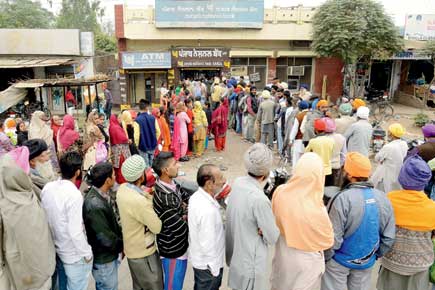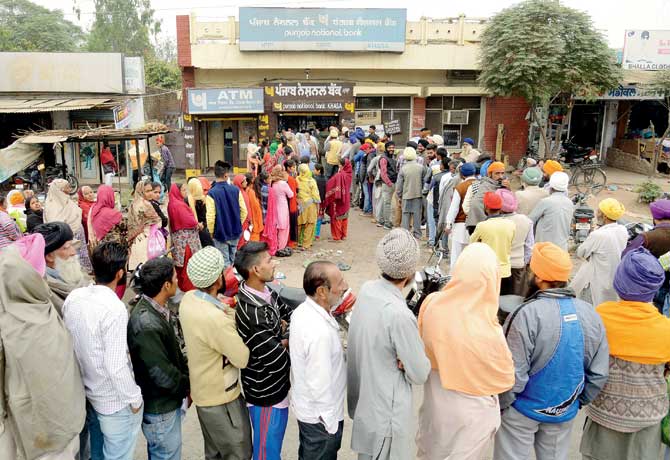The middle class is happy to queue up for hours if it results in a ‘clean system’ — never mind that they can’t prove if it even worked


Across the nation, people are queuing up outside banks like this one in Amritsar to withdraw cash or exchange old currency for new. Pic/AFP
 Till Tuesday night there was approximately Rs 17 lakh crore in circulation, of which about Rs 14 lakh crore was in 1000/500 denominations. The Reserve Bank of India has printed 40 per cent more currency since 2011, higher than the Asian average of 30 per cent; something was fishy. Prime Minister Narendra Modi attributed this to black money, but also added terrorism and counterfeiting to the mix. Terrorist financing, officials estimate, is to the order of Rs 150-200 crore. The counterfeiting estimates range from Rs 2,500 crore, as a parliamentary committee was informed in 2012, to Rs 400 crore, by the National Investigation Agency (NIA) last year. Terrorism and counterfeiting account for less than a drop in the bucket; we can safely assume Modi referenced these reasons to consolidate middle-class support for demonetisation.
Till Tuesday night there was approximately Rs 17 lakh crore in circulation, of which about Rs 14 lakh crore was in 1000/500 denominations. The Reserve Bank of India has printed 40 per cent more currency since 2011, higher than the Asian average of 30 per cent; something was fishy. Prime Minister Narendra Modi attributed this to black money, but also added terrorism and counterfeiting to the mix. Terrorist financing, officials estimate, is to the order of Rs 150-200 crore. The counterfeiting estimates range from Rs 2,500 crore, as a parliamentary committee was informed in 2012, to Rs 400 crore, by the National Investigation Agency (NIA) last year. Terrorism and counterfeiting account for less than a drop in the bucket; we can safely assume Modi referenced these reasons to consolidate middle-class support for demonetisation.
ADVERTISEMENT
Income Tax (IT) data estimates cash to form just six per cent of black money, widely believed to be the currency for real estate transactions, electoral financing, and all levels of corruption. Corrupt civil servants will hopefully be caught; since November 9, people depositing more than Rs 2.5 lakh cash at banks have already been served IT notices. The IT website will first of all show you, on your PAN-based profile, how much cash you have deposited since demonetisation.
Allegations regarding electoral financing have been thrown about. There is nothing surprising if the ruling party alerted its moneybags in UP, which has an election early next year, or in Punjab or Goa. Such are the perks of being in power. If the BJP is caught red-handed, that’s another matter. Supporting an opposition party is no reason to whine that the BJP has hoodwinked everyone else.
Real estate transactions, where land rather than built-up property is bought/sold, are most heavily skewed towards undocumented cash. A real estate broker once revealed that cash received by sellers was often shown as agricultural income, which is not taxed. Thus it seems logical that some sort of broadening of the tax base should have accompanied demonetisation. However, only a lunatic would tax agricultural income before the UP Assembly election. No one in India will ever provoke agrarian India’s ire by taxing it.
I was also told that laundering through a clutch of loss-showing dummy companies, or through rural banking accounts, will be used by New Year’s. Brokerage for laundering your money is at 25 per cent.
The real estate market has been in the doldrums for the past five years, at least. No one is buying because of absurdly high prices; the market has favoured cash-flush investors over end-users. It has become desperate in Gurgaon, on Delhi’s outskirts, which is akin to India’s Shanghai (all glass-and-steel, and miles away from interior China or Bihar). Distress sales on Sohna Road had reduced one property’s price from Rs 1.4 crore to Rs 90 lakh. Everyone was earlier expecting, in a year’s time, a 25 per cent correction in prices. With demonetisation, the recovery is now pushed back to early 2019.
Middle-class Indians standing for hours in queues outside of banks overwhelmingly support demonetisation; not so much the poor. It is like Swachh Bharat or the surgical strike across the Line of Control in Kashmir, and the middle-class bleats about the need to “clean up the system”. (One fellow then turned and spit on a shop’s shutter we stood in front of.) Those who did complain about having to queue to access their own hard-earned money were chided by others who reasoned that if jawans could guard our borders, we should not complain about banking inconvenience (which is no longer predicted to be “3-4 days”, but an eternity-spanning 21 days by the finance minister himself). “I’m not being paid to stand in line,” one youngster sullenly replied. “Jawans get a salary.”
The queues should tell you what the statistics earlier stated: that most of our cash is not black but from the undocumented society. We are not ready to become a credit society like America. If the cash printed grew by 40 per cent, it is more likely proof of a ‘trickle down’ economic effect rather than of traders sewing notes into their mattresses.
Our daily domestic help was in tears. She returned her Rs 3000 salary and asked my wife to change it for her, even though she had an Aadhar card, and even though most banks seem to have a separate queue for women (My wife agreed).
Like the surgical strike or Swacch Bharat, there will never be much concrete evidence of whether demonetisation did what it intended. Yet the middle-class will continue to bleat their approval and if someone demands evidence, they will be shouted down. (After all, if democracy is to be ‘cleaned up’ then dissent requires a surgical strike.) Now pardon me, I have to go stand in queue.
Across the nation, people are queuing up outside banks like this one in Amritsar to withdraw cash or exchange old currency for new. Pic/AFP
Senior journalist Aditya Sinha is a contributor to the recently published anthology House Spirit: Drinking in India. He tweets @autumnshade. Send your feedback to mailbag@mid-day.com
 Subscribe today by clicking the link and stay updated with the latest news!" Click here!
Subscribe today by clicking the link and stay updated with the latest news!" Click here!







